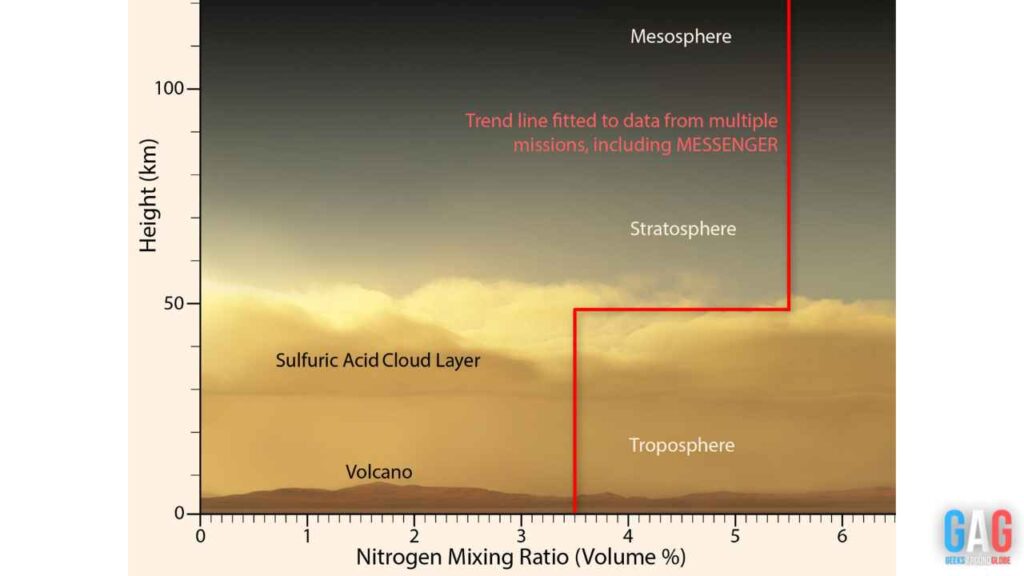Venus, often called Earth’s “Evil Twin,” stands as one of the harshest environments in our solar system. It is nearly the same size as Earth, which could make us think it’s not a big deal to go to Venus. But its harsh atmosphere has sparked countless questions about what would happen if a human ventured too close. While it’s impossible for a person to physically fall into venues, we can explore this hypothetical scenario based on scientific knowledge and what we know about the planet’s extreme conditions. So let’s see “What Happens to a Person If They Fall into Venus?“
The Venus
Venus, the second planet from the Sun, is a scorching hot world with a thick atmosphere of carbon dioxide. Its surface temperatures reach up to 864 degrees Fahrenheit (462 degrees Celsius). It makes Venus the hottest planet in our solar system. Venus’s atmosphere is also incredibly dense, trapping heat and making the planet hotter.
Despite its hostile conditions, Venus is still a fascinating world. It has mountains, volcanoes, and even rivers of lava.
Stage 1
Imagine a human somehow falling into Venus. As they go through the thick, acidic atmosphere, their body wrestles with the immense G-forces generated by the rapid descent. The astronaut’s organs and bodily systems bear the brunt of this extreme pressure.
The heat outside soars above 900 degrees Fahrenheit (475 degrees Celsius). Without the protective shell, the human body would succumb to the searing heat in mere moments.

Stage 2 – The Surface Challenge
But if a person somehow passed stage 1, it’s time to check about stage 2. Upon reaching Venus’ surface, the human body encounters an immediate and formidable adversary. The crushing atmospheric pressure. At this juncture, the human body should have cocooned within a specially designed spacesuit, preventing their internal organs from being compressed by the atmospheric pressure. Atmospheric pressure is 92 times greater than on Earth.
Without safeguards, heatstroke would swiftly take its toll, and the human body would open to extreme heat.
Stage 3 – Acid clouds
The human body is enveloped by a hostile environment, including sulfuric acid clouds overhead. Even a minor breach in the suit could expose the human body to this corrosive substance. If a person’s suit is not crafted to be acid-resistant, the human body will dissolve in acid this time. But what happens next if a person survives at this level?
Stage 4 – Breathing in atmosphere
If a human were to breathe in the atmosphere of Venus, they would die very quickly. The atmosphere of Venus is made up of 96.5% carbon dioxide, 3.5% nitrogen, and trace amounts of other gases, including sulfur dioxide and sulfuric acid. Carbon dioxide is a poisonous gas; breathing it in high concentrations can cause several problems, including dizziness, nausea, headache, and respiratory failure.
Sulfur dioxide and sulfuric acid are also toxic gases; breathing them in can cause severe burns to the lungs and airways. Additionally, the high pressure of the Venusian atmosphere would make it difficult for humans to breathe, and the heat would cause their lungs to expand and burst.
Within minutes of breathing in the Venusian atmosphere, a human would experience severe respiratory distress. They would cough and wheeze, and their breathing would become rapid and shallow. As the carbon dioxide poisoning progressed, they would become confused and disoriented, and their heart rate and blood pressure would increase. Eventually, they would lose consciousness and die. In short, breathing in the atmosphere of Venus would be a very unpleasant and deadly experience.
Stage 5 – walking on the surface
If a human were to walk on the surface of Venus, they would die very quickly. The surface temperature of Venus can reach up to 864 degrees Fahrenheit (462 degrees Celsius), which is hot enough to melt lead. The atmosphere of Venus is also incredibly dense, with a pressure that is over 90 times that of Earth.
Within seconds of stepping onto the surface of Venus, a human would be overcome by the heat and pressure. Their skin would blister and peel, and their lungs would collapse. They would also be bombarded by sulfuric acid rain, further damaging their skin and lungs.
Within minutes, a human would be dead. Their body would be so badly burned and dehydrated that it would be unrecognizable. In short, walking on the surface of Venus would be a very painful and deadly experience. It is simply not possible for humans to survive in the hostile environment of Venus.
Conclusion
Venus remains a distant aspiration, given that our current technology falls far short of the requirements for safely transporting humans to this inhospitable world. Nevertheless, as we continue to explore Venus remotely through robotic missions, we gradually unveil the mysteries of this fiery planet without jeopardizing human lives.
Also read: